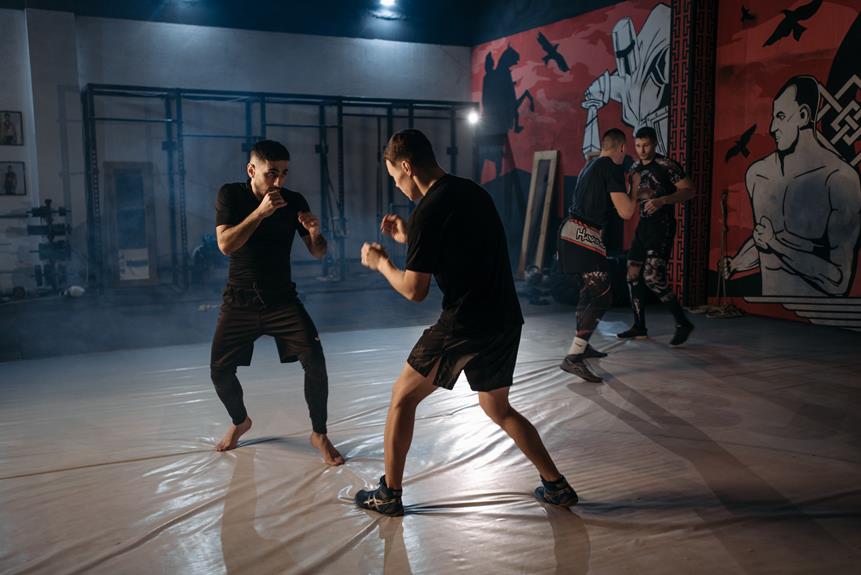Are you an amateur MMA fighter wondering how much you can earn? Look no further!
This article will shed light on the financial aspects of pursuing a career in mixed martial arts. We will explore six different ways in which amateur fighters can generate income, including receiving a percentage of ticket sales, undisclosed discretionary payments, sponsorships, selling personal merchandise, and more.
By delving into each avenue, this article aims to provide valuable insights and strategies for fighters to monetize their efforts while pursuing their dreams in the sport.
Key Takeaways
- Amateur MMA fighters can earn money through various methods such as ticket sales commissions, discretionary payments, and sponsorships.
- Selling tickets to the event they will be fighting at allows amateur fighters to earn a percentage of ticket sales as a commission, typically ranging from $100 to $200 per fight.
- Some fighters may receive undisclosed discretionary payments, especially if they have a solid online following or show potential to become professional fighters.
- Certain promoters may cover select fighters' travel and hotel expenses, usually after a successful event and in exchange for their presence at the promoter's next event.
Percentage of Ticket Sales
Percentage of ticket sales can be a significant source of income for amateur MMA fighters, as they receive a commission based on the number of tickets sold for the event they are participating in. The commission rate is negotiable with the MMA promoter, allowing fighters the opportunity to maximize their earnings potential.
However, several factors can affect the amount an amateur fighter can earn from ticket sales. Building an online presence and engaging with fans can increase ticket sales, ultimately leading to higher commissions. Additionally, the popularity of the event and the fighter's own reputation within the MMA community can influence ticket sales and, consequently, their earnings.
On average, amateur fighters can expect to make around $100 to $200 per fight from ticket sales commissions, making it a valuable revenue stream for those looking to establish themselves in the sport.
Discretionary/Locker Room Payment (Undisclosed)
Receiving discretionary payments under the table, amateur MMA fighters have the opportunity to supplement their earnings beyond the disclosed methods of income. These secret payments, provided by promoters, can be a way for fighters to earn extra money based on certain criteria. Here are four key aspects of this under the table compensation:
- Promoters may offer these payments to fighters who have a significant online following or show potential to become professional.
- Fighters may receive discretionary payments for accepting fights on short notice, helping maintain the promotion's reputation and ensuring the promised number of fights.
- The amount of these undisclosed payments can vary, depending on factors such as the fighter's popularity and the significance of the event.
- These secret payments are not publicly disclosed and often go unreported, making it difficult to determine the exact amount fighters receive.
Amateur fighters who are fortunate enough to receive discretionary payments can enjoy an additional boost to their income, providing them with some financial support as they pursue their MMA careers.
Generous Promoters Who Might Cover Some Expenses
Occasionally, promoters of amateur MMA events may generously cover certain expenses for select fighters, providing them with additional financial support. These promoters have various motivations for offering such assistance.
Firstly, they may want to attract high-quality fighters with a strong online following to their event. By covering travel and hotel expenses, promoters can ensure that these fighters participate, thus increasing the event's overall appeal.
Additionally, promoters may offer to cover expenses as a gesture of appreciation for fighters who have performed exceptionally well in previous events or have the potential to become professional fighters. The selection process for receiving this financial support is often based on a fighter's reputation, skill level, and marketability.
Promoters aim to create a competitive and entertaining event, and by financially supporting select fighters, they can enhance the overall quality of the competition.
Sponsorships
Amateur MMA fighters can secure sponsorships by reaching out to businesses and through connections at their gym, and these sponsorships typically range from $100 to $200 in payment. Finding potential sponsors can be a strategic process that involves identifying businesses that align with the fighter's personal brand and values.
Benefits of sponsorships for amateur MMA fighters include financial support, exposure, and the opportunity to build relationships with businesses in the industry. Here are four key points to consider when it comes to sponsorships:
- Sponsorships provide financial support for fighters, helping to cover training expenses, travel costs, and equipment.
- Sponsorships offer exposure to a wider audience through logos on fight shorts, banners, social media shoutouts, and other promotional materials.
- Sponsorships can lead to networking opportunities, allowing fighters to establish connections with businesses and industry professionals.
- Sponsorships can also enhance a fighter's credibility and reputation, as being associated with reputable brands can increase their value in the eyes of promoters, fans, and potential sponsors.
Selling Personal Merchandise
Selling personal merchandise can be a lucrative opportunity for professional MMA fighters, as it allows them to capitalize on their brand and generate additional income. By creating and marketing their own merchandise, fighters can not only increase their revenue but also strengthen their fan base and brand loyalty. Successful marketing strategies play a crucial role in maximizing sales and reaching a wider audience. Here is an example of a table showcasing different types of merchandise and their marketing strategies:
| Type of Merchandise | Marketing Strategies |
|---|---|
| T-shirts | Collaborating with local clothing brands or designers |
| Hats | Offering limited edition designs or autographed versions |
| Posters | Creating exclusive designs for specific events or fights |
Crowdfunding
While not a guaranteed source of income, crowdfunding can provide amateur MMA fighters with an alternative avenue to finance their training, equipment, and other expenses. Crowdfunding platforms for amateur MMA fighters offer a way for fighters to connect with fans and supporters who are willing to contribute financially to their career. Here are four crowdfunding platforms that can help amateur MMA fighters raise funds:
- GoFundMe: A popular crowdfunding platform where fighters can create campaigns to raise money for specific needs, such as training camps or travel expenses.
- Patreon: This platform allows fighters to offer exclusive content and perks to fans who support them on a monthly basis.
- Kickstarter: While primarily used for creative projects, Kickstarter can also be utilized by fighters to launch a new training program or fund a documentary about their journey.
- IndieGoGo: Similar to Kickstarter, IndieGoGo provides a space for fighters to showcase their projects and receive financial support from backers.
Building an Online Presence
One effective strategy for amateur MMA fighters to increase their visibility and attract potential sponsors is by actively engaging with their online audience through various social media platforms. Building a strong online presence through social media marketing is crucial for fighters looking to build a fan base and establish themselves in the industry.
By consistently sharing updates about their training, upcoming fights, and personal life, fighters can connect with fans and potential sponsors on a more personal level. This allows them to showcase their skills, personality, and dedication, which can attract a loyal following and increase their chances of securing sponsorships.
Through regular interaction with their online audience, fighters can also gain valuable feedback and support, which can further enhance their reputation and career prospects in the world of MMA.
Reaching Out to Businesses for Sponsorships
In order to secure sponsorships, amateur MMA fighters can reach out to businesses that align with their personal brand and values. Reaching out to businesses for sponsorships can be an effective strategy for fighters looking to earn additional income and gain exposure. Here are some effective sponsorship strategies for amateur MMA fighters:
- Research potential sponsors: Identify businesses that have a connection to the MMA industry or share similar values with you as a fighter.
- Create a sponsorship proposal: Craft a professional proposal that outlines your achievements, goals, and the benefits of sponsoring you.
- Personalize your approach: Tailor your outreach to each potential sponsor, highlighting how their brand can benefit from associating with you.
- Offer value to sponsors: Provide businesses with opportunities for brand exposure through social media shoutouts, logo placement on your fight gear, or event appearances.
Negotiating Commission Rates
Commission rates for amateur MMA fighters can be negotiated with promoters to ensure fair compensation for their participation in events. When negotiating commission rates, it is essential for fighters to consider various factors that can influence their earnings potential.
Factors such as the fighter's experience, popularity, and ticket sales can play a significant role in determining the commission rate. Experienced fighters with a strong online presence and a large following may have more leverage in negotiating higher commission rates.
Additionally, fighters can employ certain strategies to maximize their earnings. These strategies can include building a strong online presence, promoting ticket sales, and demonstrating their value to the promoter.
Factors Affecting Earnings Potential
To effectively understand the factors affecting earnings potential, it is important for amateur MMA fighters to regularly analyze their online presence and strategize their promotional efforts. The impact of social media presence on earnings cannot be understated.
Here are some factors that can affect long-term career prospects and earnings potential for amateur MMA fighters:
- Skill level and performance in fights: Consistently winning matches and showcasing exceptional skills can attract more attention from promoters and sponsors, leading to higher earning opportunities.
- Reputation and professionalism: Maintaining a positive reputation within the MMA community and conducting oneself professionally can enhance the chances of securing better fights and sponsorship deals.
- Marketability and fan base: Building a strong online presence and cultivating a dedicated fan base can make fighters more attractive to sponsors and promoters, increasing their earning potential.
- Networking and connections: Establishing relationships with influential individuals in the MMA industry, such as trainers, managers, and promoters, can open doors to better opportunities and higher earnings.
Conclusion
In conclusion, amateur MMA fighters have several avenues for earning income. By receiving a percentage of ticket sales, undisclosed discretionary payments, and support from generous promoters, fighters can generate additional funds.
Securing sponsorships and selling personal merchandise are also effective methods for monetizing their efforts. Additionally, building an online presence and reaching out to businesses for sponsorships can further enhance their earnings potential.
It is important for fighters to understand these strategies and negotiate commission rates effectively to maximize their income. For instance, one hypothetical case study could be a fighter who successfully secures multiple sponsorships, sells merchandise online, and negotiates higher commission rates, resulting in a significant increase in their earnings.
- 15 Best Martial Arts Weapons (Fighting & Training) - October 14, 2024
- Is Fencing a Martial Art? (Yes, 4 Reasons Why) - October 14, 2024
- 7 Best Martial Arts for Self-defense Ranked (Highly Effective) - October 14, 2024










